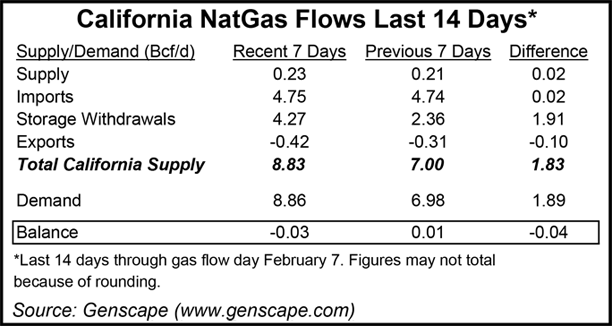Markets | Infrastructure | NGI All News Access
California Grid Operator Issues Alert on NatGas Shortage
Severe winter weather conditions in other areas of the nation prompted California’s independent grid operator Thursday afternoon to issue an energy conservation alert because of constraints on natural gas supplies imported into the state from the Southwest, Rockies and western Canada.

California depends on natural gas for the vast majority of its electricity generation, and more than 90% of its gas supplies come from outside the state.
What the California Independent System Operator (CAISO) called shortages of gas supplies to certain power plants prompted the grid operator to issue a market notice (see Daily GPI, Feb. 6), effective through 10 p.m. PST Thursday, asking for voluntary gas and electricity conservation measures to free up supplies of both. CAISO said it was working with both gas suppliers and generators to mitigate the shortage situation.
In addition to the conservation request, CAISO said it was seeking support from other generating resources in the region to assist during the gas shortage, and the organization continues to monitor natural gas prices and their impact.
“A shortage of natural gas, triggered by extreme cold weather in much of the United States and Canada, is impacting fuel supplies to certain power plants and is reducing electricity generation in Southern California,” CAISO’s notice said. “The CAISO is working with natural gas companies and generators to reduce gas consumption at impacted generating stations. Statewide electricity and gas conservation will help free up both electricity and gas supplies.”
Separately, the Los Angeles Department of Water and Power (LADWP), the nation’s largest municipal utility and one of the largest gas users in the state, issued an alert calling for conservation among its customers, mirroring the message from CAISO. “LADWP is being asked to reduce the amount of power fueled by natural gas during this period, and customer conservation will provide a cushion for the power supply,” LADWP said.
Natural gas demand in California increased 27% week-over-week, rising to 8.86 Bcf/d during the last seven days from 6.98 Bcf/d during the previous seven days, according to Genscape. Imports were basically unchanged week-over-week at 4.75 Bcf/d and 4.74 Bcf/d, respectively, so the state has had to rely on storage withdrawals to keep supply and demand in balance. California consumed 4.27 Bcf/d from storage during the past seven days, versus 2.36 Bcf/d during the preceding seven-day period.
Meanwhile in the Lone Star state, the Electric Reliability Council of Texas (ERCOT), grid operator for most of the state, on Thursday asked electric consumers to reduce electric usage from 5 p.m. CST through noon CST on Friday. Natural gas supplies for power generating facilities were a factor, ERCOT said.
“With the cold weather that began last night, we already saw electric demand close to our winter record this [Thursday] morning,” said Dan Woodfin, ERCOT director of system operations. “We are expecting cold weather to continue through [Friday] morning’s high-demand period, and some generation capacity has become unavailable due to limitations to natural gas supplies.”
ERCOT peak demand Thursday morning exceeded 57,000 megawatts (MW) and could reach or break its 57,277 MW record before the current winter weather leaves the region, the grid operator said.
© 2024 Natural Gas Intelligence. All rights reserved.
ISSN © 1532-1231 | ISSN © 2577-9877 |
